Hiring a database developer is a critical task for many organizations looking to manage and optimize their data infrastructure. As a recruiter, you're tasked with finding candidates who not only have technical expertise but also align with your company's specific needs and culture. Many hiring managers overlook the importance of soft skills and problem-solving abilities, focusing solely on technical qualifications. This approach can lead to mismatches and potential turnover down the line.
This comprehensive guide will walk you through the process of hiring a top-notch database developer, from understanding the role to conducting effective interviews. We'll cover key skills to look for, where to find qualified candidates, and how to assess their abilities effectively. For a deeper dive into specific database skills, check out our SQL online test and other relevant assessments.
Table of contents
Why Hire a Database Developer?
To determine if you need a database developer, start by identifying data-related challenges in your organization. For example, you might be struggling with slow query performance, data inconsistencies, or the need to integrate multiple data sources.
Consider hiring a database developer if you're facing issues like:
- Inefficient data storage and retrieval
- Need for custom database solutions
- Data migration or integration projects
If these problems are ongoing and critical to your business operations, it's time to bring a full-time database developer on board. For short-term or specialized projects, working with a consultant might be a more suitable option.
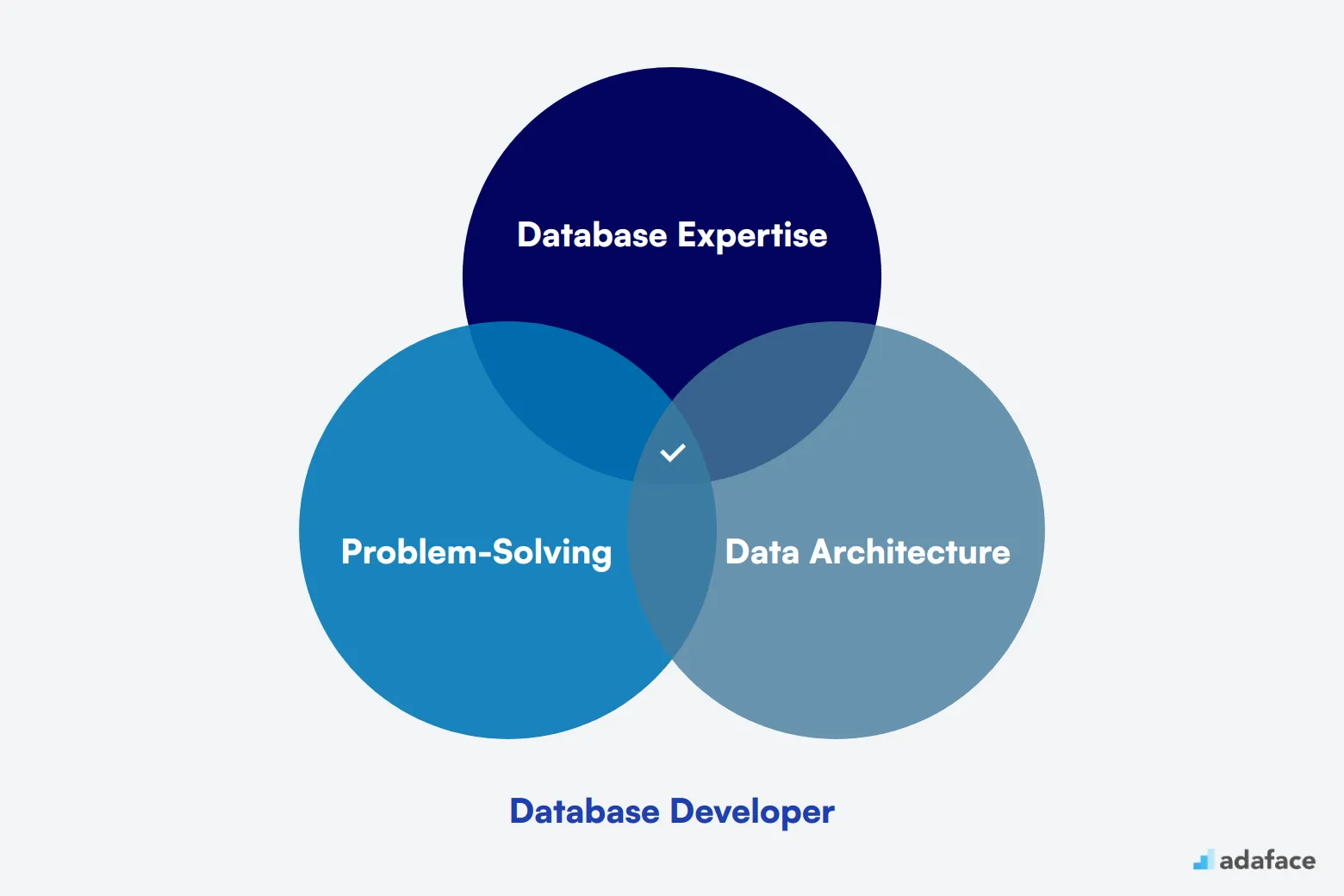
Database Developer Hiring Process
The hiring process for a Database Developer typically spans 4-6 weeks. Here's a quick overview of the key stages:
- Post a well-crafted job description on relevant job boards
- Review resumes and shortlist candidates (1 week)
- Conduct technical screening using skill assessments (1 week)
- Interview shortlisted candidates (1-2 weeks)
- Make an offer to the best candidate
Each step is critical in finding the right Database Developer for your team. Let's dive deeper into these stages to ensure you're fully equipped for a successful hiring process.
Skills and qualifications to look for in a Database Developer
When hiring a Database Developer, defining the right candidate profile can be a bit tricky. Different companies prioritize different skills, so it's important to draw a clear line between what's required and what's preferred for your specific needs. For instance, while some teams may demand strong SQL proficiency, others might prioritize experience with NoSQL databases.
Start by identifying the must-have skills for your team. Typically, a Bachelor's degree in Computer Science or similar fields, along with proficiency in SQL and database management systems like MySQL and PostgreSQL, are foundational. Experience in database design and optimization is also key.
On the preferred side, consider candidates with experience in NoSQL databases, familiarity with ETL processes, and knowledge of data warehousing concepts. Certifications, such as the Oracle Certified Professional, can be an added advantage. Explore how you can screen SQL developers effectively.
| Required skills and qualifications | Preferred skills and qualifications |
|---|---|
| Bachelor's degree in Computer Science, Information Technology, or related field | Experience with NoSQL databases (e.g., MongoDB, Cassandra) |
| Proficiency in SQL and database management systems (e.g., MySQL, PostgreSQL, Oracle) | Familiarity with ETL processes and tools |
| Experience with database design, implementation, and optimization | Knowledge of data warehousing concepts |
| Knowledge of data modeling and normalization techniques | Experience with version control systems (e.g., Git) |
| Strong problem-solving and analytical skills | Certification in database technologies (e.g., Oracle Certified Professional) |
How to write a Database Developer job description?
Once you have a candidate profile ready, the next step is to capture that information in the job description to attract the right candidates. A well-crafted job description can significantly influence the quality of applicants you'll receive.
• Highlight key responsibilities and impact: Clearly outline the core duties of the database developer, such as designing database systems, optimizing performance, and ensuring data security. This helps candidates understand how their work will contribute to the organization’s success.
• Balance technical skills with soft skills: While it’s essential to mention technical proficiencies, such as SQL, NoSQL, or database management tools, don’t overlook the importance of soft skills like teamwork and problem-solving. A candidate who can collaborate effectively will drive better project outcomes.
• Showcase your company's unique selling points: Make your organization stand out by highlighting what makes the role attractive, whether it’s opportunities for professional development, innovative projects, or a supportive team culture. This can entice top talent to consider your opening.
For a comprehensive example, refer to a detailed database developer job description to guide you in creating your own.
Top Platforms to Source Database Developers
With a well-crafted job description in hand, it's time to cast your net and find the perfect Database Developer. Job listing sites are your go-to resource for sourcing qualified candidates. These platforms offer a wide reach and specialized features to help you connect with the right talent.
Ideal for posting full-time positions due to its wide professional network and recruitment tools.

Indeed
Suitable for full-time job listings because of its vast job seeker audience and easy-to-use posting features.

Monster
A good platform for full-time hires with a long-standing reputation and extensive resume database.
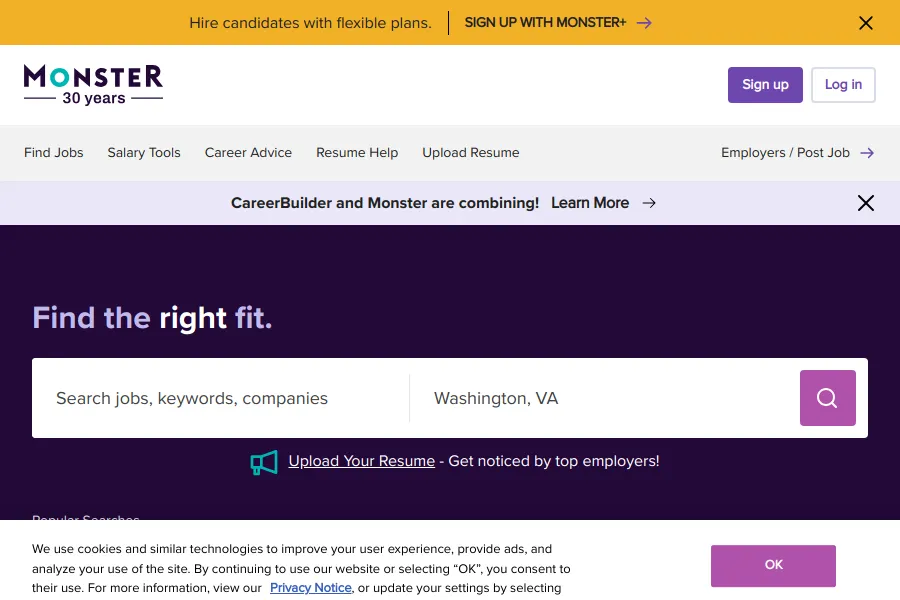
For freelance and remote work, platforms like Upwork, Freelancer, and FlexJobs offer flexible hiring options. Startups may find success on AngelList, while tech-focused sites such as Stack Overflow Jobs, TechCareers, and Dice cater specifically to the IT industry. These platforms provide targeted access to skilled database professionals, helping you streamline your hiring process and find the best fit for your team.
Keywords to Look for in Database Developer Resumes
Resume screening is a crucial step in hiring Database Developers. It helps you quickly identify candidates with the right skills and experience, saving time in the interview process.
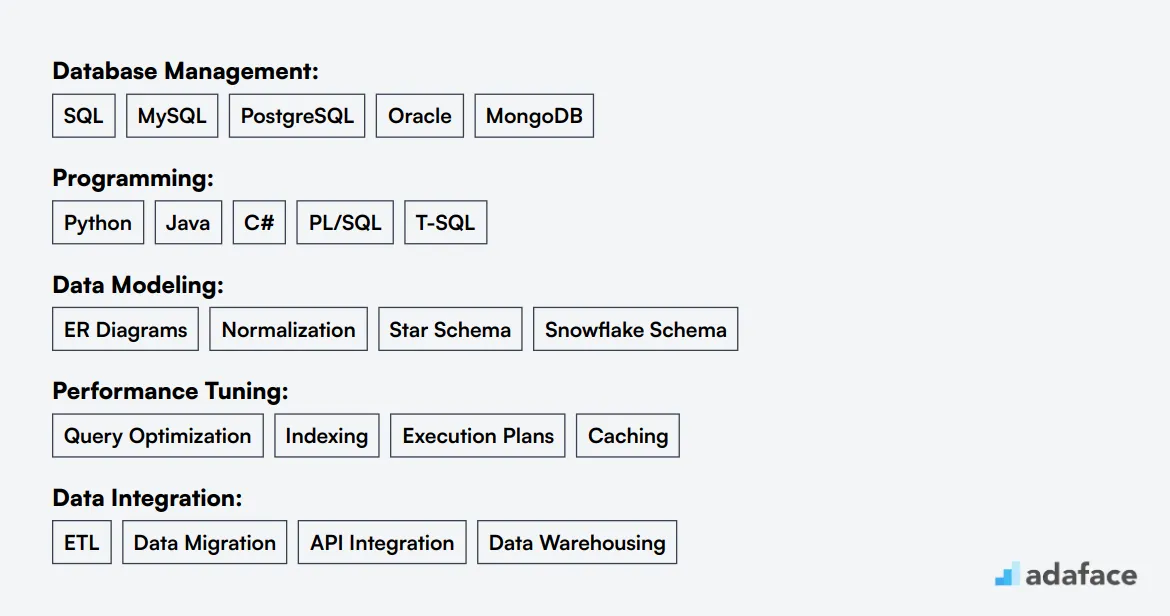
When manually screening resumes, focus on key technical skills like SQL, database management systems (MySQL, PostgreSQL, Oracle), and data modeling. Look for experience with database design and optimization, as well as problem-solving abilities.
AI-powered tools can streamline the screening process. You can use large language models like ChatGPT or Claude to analyze resumes based on specific criteria. This approach can be faster and more consistent than manual screening.
Here's a sample prompt for AI-based resume screening:
TASK: Screen resumes for Database Developer role
INPUT: Resumes
OUTPUT:
- Candidate Name
- Matching keywords
- Score (out of 10)
- Recommendation
- Shortlist (Yes/No/Maybe)
KEYWORDS:
- SQL (MySQL, PostgreSQL, Oracle)
- Database Design and Optimization
- Data Modeling
- ETL Processes
- Programming (Python, Java, PL/SQL)
- [NoSQL databases](https://www.adaface.com/assessment-test/nosql-test) (MongoDB, Cassandra)
Which skills tests should you use to assess Database Developers?
Skills tests are a great way to evaluate Database Developers objectively. They help you assess candidates' practical knowledge and abilities beyond what's listed on their resumes. Here are some recommended tests for screening Database Developers:
SQL skills test: SQL is the foundation of database management. This test evaluates a candidate's ability to write queries, manage data, and optimize database performance.
Data Modeling test: A Data Modeling test assesses a candidate's ability to design efficient database structures. It checks their understanding of relationships, normalization, and schema design.
Database-specific tests: Depending on your tech stack, you might want to use tests for specific database systems like MySQL, PostgreSQL, or Oracle PL/SQL. These tests evaluate proficiency in platform-specific features and syntax.
Data Structures test: A solid understanding of data structures is important for database optimization. This test checks a candidate's knowledge of various data structures and their applications in database contexts.
NoSQL test: If your organization uses NoSQL databases, a NoSQL test can be valuable. It assesses a candidate's familiarity with non-relational database concepts and popular NoSQL systems.
How to Structure the Interview Stage for Hiring Database Developers
Once candidates successfully pass the skills tests, it's time to move them to the technical interview stage to further assess their hard skills. Skills tests are excellent for filtering out unfit candidates, but technical interviews identify the best-suited individuals for the role. This stage allows recruiters to thoroughly understand a candidate's expertise and problem-solving abilities, setting the stage for some sample interview questions.
Consider asking the following questions during the interview: 1. Explain normalization and why it is important. Understanding normalization ensures data integrity and efficiency in database design. 2. How do you optimize complex SQL queries? Optimizing queries is critical for performance management. 3. Describe a situation where you implemented data security measures in a database. This reveals their approach to data protection. 4. What are the differences between SQL and NoSQL databases? Understanding this helps in selecting the right database solutions. 5. How do you handle database version control? This question assesses their organizational skills and experience with tools. For insights into these subjects, you can explore more about data modeling interview questions.
How much does it cost to hire a Database Developer?
The cost to hire a Database Developer can vary quite a bit based on factors like experience, location, and skill set. In the United States, the average salary is around $108,700 annually, with a range from $71,095 to $152,167. In Australia, salaries average about AUD 104,383 and can range from AUD 74,356 in Brisbane to AUD 145,922 in Sydney. These numbers reflect the differing demands and costs in various regions.
Database Developer Salary in the United States
The average salary for a Database Developer in the United States is approximately $108,700 per year. Salaries can range from a low of $71,095 to a high of about $152,167, depending on factors such as experience, location, and specific skill sets.
For instance, in major cities like Boston and New York, salaries can reach upwards of $120,478 and $114,087 respectively, reflecting the demand for skilled professionals in these markets.
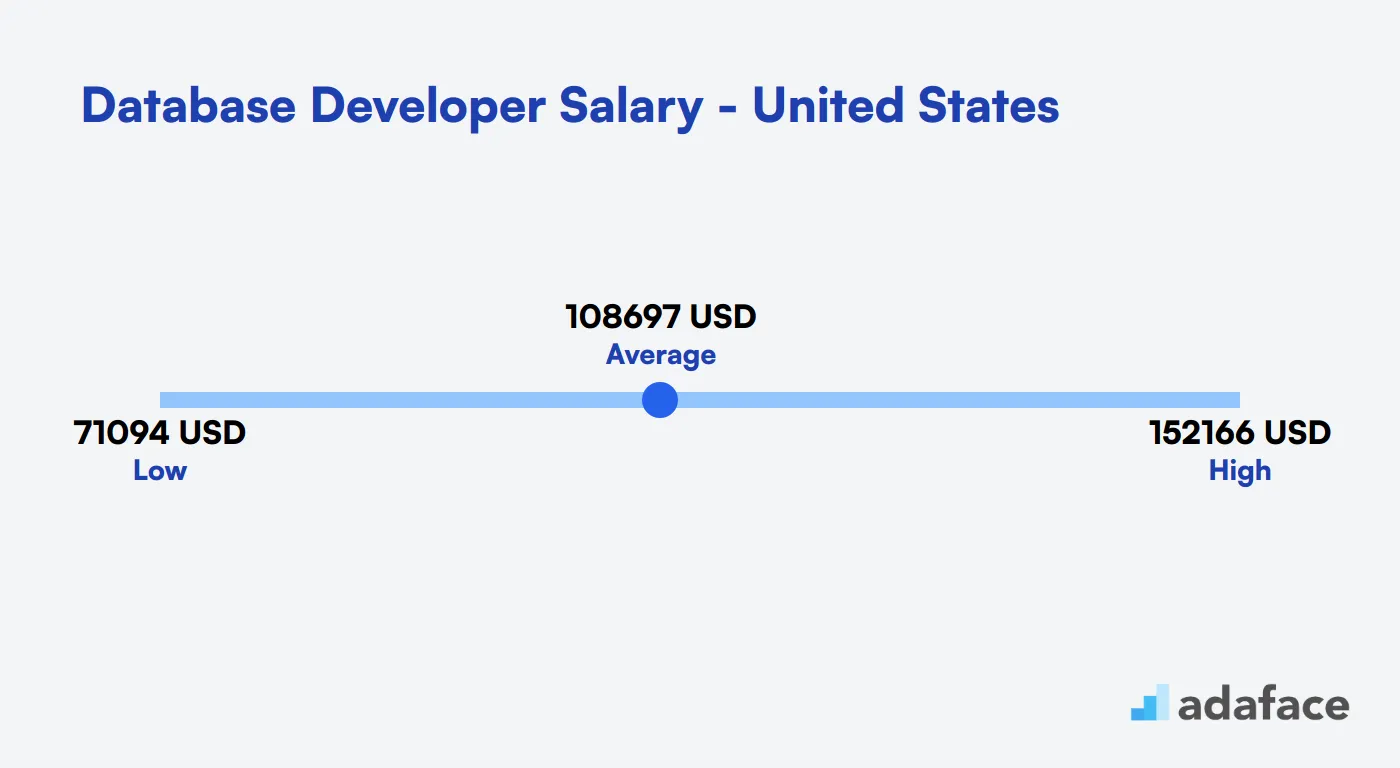
Database Developer Salary Australia
The average salary for a Database Developer in Australia is approximately AUD 104,383. Depending on the location, salaries can range from around AUD 74,356 in Brisbane to about AUD 145,922 in Sydney. As a recruiter, understanding these variations can help you better tailor your offers and attract top talent in the competitive landscape.
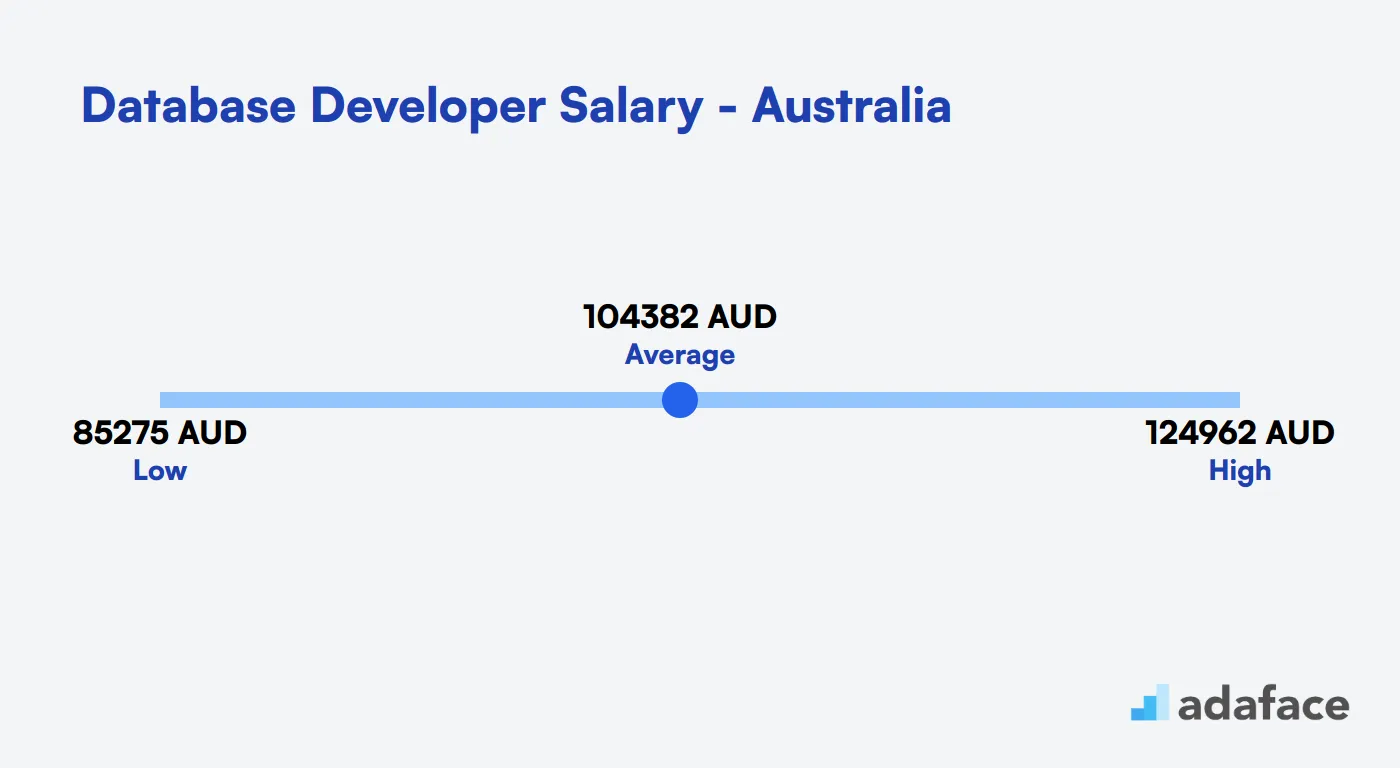
What are the ranks of Database Developers?
When recruiting for database developers, it can be challenging to differentiate between the various roles due to the overlapping skills and responsibilities. Understanding the hierarchy can help in targeting the right candidates for your needs.
• Junior Database Developer: This is an entry-level role where the developer is learning the ropes of database management. They assist senior team members in maintaining and optimizing existing databases, and they are often involved in documentation and basic troubleshooting.
• Database Developer: In this mid-level position, the developer is more autonomous and capable of designing database systems and writing complex queries. They work on database design and development, ensuring databases are efficient and meet user requirements. Check out database developer job description for more insights.
• Senior Database Developer: A senior developer has extensive experience and expertise in advanced database design and architecture. They are involved in guiding the development team, optimizing performance, and implementing high-level security measures.
• Lead Database Developer: As the leader of the database development team, this role involves overseeing projects and ensuring that all development aligns with the business goals. The lead developer also mentors junior staff and collaborates with other departments to ensure data integrity and accessibility.
Hire the Best Database Developers
In this guide, we've covered the key aspects of hiring database developers. From understanding the role to crafting job descriptions, sourcing candidates, and conducting interviews, each step plays a part in finding the right talent for your team.
The most important takeaway is to use well-crafted job descriptions and skill tests to make your hiring process more accurate. By assessing candidates' technical skills and problem-solving abilities, you can ensure you're bringing on board developers who can truly contribute to your database projects and team success.
SQL Online Test
FAQs
Key skills for a database developer include proficiency in SQL, database design, data modeling, performance tuning, and familiarity with specific database management systems like MySQL, Oracle, or PostgreSQL. They should also have strong problem-solving abilities and excellent communication skills.
You can assess technical skills through coding tests, technical interviews, and practical assignments. Online assessment platforms like Adaface offer specialized SQL coding tests and other relevant evaluations to gauge candidates' abilities objectively.
Qualified database developers can be found on professional networking sites like LinkedIn, job boards specializing in tech roles, developer communities like Stack Overflow, and through referrals from current employees. You can also consider partnering with tech bootcamps or universities with strong computer science programs.
A comprehensive job description should include required technical skills, experience level, specific responsibilities, projects they'll be working on, and any industry-specific knowledge needed. It's also helpful to mention the tech stack your company uses and any opportunities for professional growth. Check out our database developer job description template for more guidance.
Soft skills are very important for database developers. They often need to collaborate with other team members, communicate complex concepts to non-technical stakeholders, and manage projects. Look for candidates with strong teamwork, communication, problem-solving, and time management skills.
Ask a mix of technical and behavioral questions. Technical questions should cover database design principles, SQL queries, performance optimization, and specific technologies you use. Behavioral questions should assess problem-solving skills, teamwork, and how they handle challenges. For ideas, check our database developer interview questions guide.
To ensure a good fit, clearly communicate your company culture and values during the hiring process. Use behavioral interviews to assess cultural alignment, and consider a trial project or probationary period. Involve team members in the interview process to get different perspectives on the candidate's fit.

40 min skill tests.
No trick questions.
Accurate shortlisting.
We make it easy for you to find the best candidates in your pipeline with a 40 min skills test.
Try for freeRelated posts
Free resources



